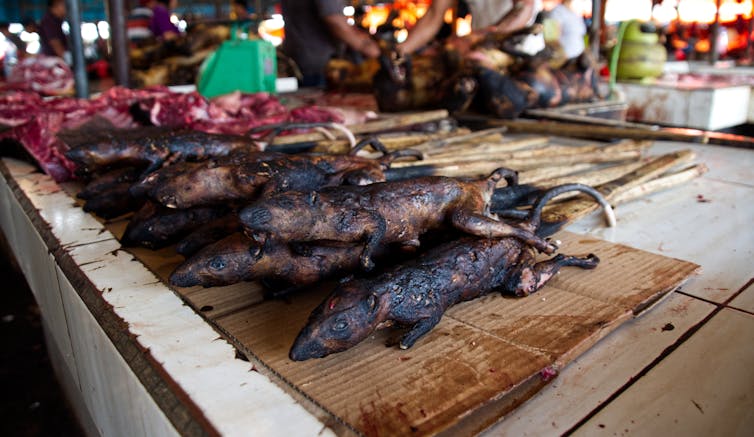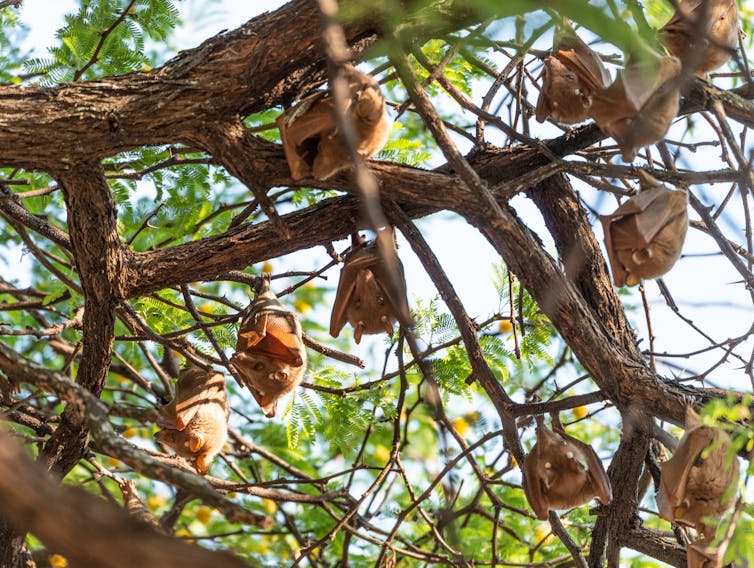
Julia E. Fa, Manchester Metropolitan University
As much as 70% of the infectious diseases that emerged in humans over the last 30 years were zoonotic, which means they were caused by pathogens which originated in domestic or wild animals. Nearly 1.7 million undiscovered viruses may exist in wildlife. Despite these alarming numbers, epidemics are still relatively rare events. But, amid the COVID-19 pandemic, it’s clear we can no longer ignore the potential threat of diseases which spill over from wildlife to humans.
As outbreaks of diseases such as COVID-19, Ebola, SARS and HIV have shown, the costs of addressing zoonoses pale in comparison with the impact of epidemics on human lives and economies. As people degrade natural habitats and intensify livestock production and trade, we risk yet more outbreaks. Preventing, detecting and responding to future pandemics is possible, and one of the key battlegrounds in this effort is the wild meat trade – food consumed by millions of people, especially in the tropics and subtropics, from animals hunted in the wild.
In a
, we analysed the latest knowledge and provided recommendations on how to keep one step ahead of the next epidemic. They included:1. Reduce wild meat demand in cities
When thousands of millions of urbanites have access to wild meat, not only are animal populations likely to be more depleted, but it’s also possible that at least one person will be infected by a pathogen of wildlife origin and transmit it in densely populated areas.
Reducing the demand for wild meat in cities requires a combination of marketing, to convince people that wild meat risks more zoonotic outbreaks, and to ensure there are alternative sources of protein, such as chicken and other domestic meat. This is especially important in provincial towns, near where wild meat is sourced, where options are more limited.
Where the trade is legal, enforcing selective bans on the sale of live or fresh wildlife will probably be more effective than permanent, blanket bans. Bans should target animals that present a higher risk of spillover too, such as bats, rodents and primates, which are generally suspected to be possible reservoir species.

2. Bring in wildlife experts
Human, animal and environmental health are intimately connected. In the past, physicians and veterinaries might discuss how to limit outbreaks and work together on solutions. But it is time that biologists, and people working in the forestry, wildlife and environment sectors – such as park rangers and field veterinarian – were consulted on where the next zoonotic outbreak is likely to occur.
At the moment, systems for tracking and acting on emerging pathogens in the wild meat trade are almost non-existent. But the trade crosses national borders. Surveillance systems that include a combination of health and public sector experts and frontline professionals are needed to allow for a rapid response.
Only by sustainably managing habitats, assessing them for disease risks from multiple angles, and controlling the wildlife trade can we expect to make progress on public health issues.
3. Improve legislation
If policies on food safety and health are to be effective, they need to be socially accepted. That means regulating the use of wildlife, while also ensuring the millions of people dependent on wild meat for food and income have alternatives to turn to. It’s estimated that five million tonnes of wild meat is eaten per year in the Congo basin, and some 1.3 million tonnes in the Amazon.
When habitats are fragmented, it brings people, livestock and wildlife into closer contact, raising the risk of zoonoses spilling over. Currently, around 70% of the world’s remaining forest cover is within one kilometre of the forest’s edge and, as a result, is at high risk of being depleted and degraded further. By legally recognising the territorial rights of Indigenous peoples and communities local to forests, we can protect habitats and limit the exchange between wildlife and encroaching urban settlements.
Read more: Protecting indigenous cultures is crucial for saving the world’s biodiversity
It is also important to bring in legislation that will make the wild meat trade as hygienic as possible. Hunters and tradespeople can take the lead on this, by making sure all traded wild meat is thoroughly smoked or dried.
The world is facing a life-changing situation that calls for each country to adapt and prepare for future epidemics. Global measures and coordinated efforts can help us better understand why infectious diseases emerge and re-emerge, and how to stop them in their tracks.
Julia E. Fa, Professor of Biodiversity and Human Development, Manchester Metropolitan University
This article is republished from The Conversation under a Creative Commons license. Read the original article.

